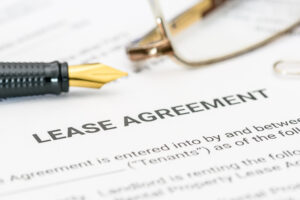Inflation. Interest rate increases. High construction costs. Increased crime rates in urban business districts. Geopolitical tensions. An upcoming presidential election. Slow post-pandemic return of employees. You name it – uncertainty abounds in the world at large and has a direct impact on the U.S. real estate market, from both a commercial and residential perspective. While there is certainly great risk in the market, whether you’re a landlord/lessor or a tenant/lessee, there is also great opportunity, notably when it comes to real property leases. See how a lease attorney can help negotiate and support your next lease agreement in today’s market.
Commercial lease opportunities
Leasing office, industrial, or retail space can be highly profitable for landlords, providing steady rental income and long-term tenant relationships. Securing the right commercial lease can mean establishing a strategic location for business operations, and right now, tenants are looking for flexibility. In most contract scenarios, tenants have the power to negotiate elements of a lease, such as: 
- Lease duration – especially for startups, finding a lease with a shorter term is desirable while business viability is established; “pop-ups” have also become trendy in the retail market, with online businesses testing an in-person experience
- Restrictive covenants – in large retail spaces or shopping centers, tenants want to know they won’t be next door or in close proximity to a top competitor; landlords may be asked to agree not to also lease to similar businesses or direct competition
- Rent escalations – while common for rent to increase year over year and with rising maintenance costs, tenants may seek to negotiate rates to remain the same over an extended period of time
- Tenant improvement allowance – in order to customize a space or make it usable for a more specific purpose, a tenant may ask for credits towards construction, adding fixtures, and more
- Rent abatement – as a tenant settles into their space, they may incur moving costs and other expenses; in turn, they may seek rent abatement or a few months of no rent payments to offset these costs until their business is up and running
Notably for commercial office space rentals, current trends also show an increase in tenants’ interest in environmental, social, and governance (ESG) standards, as well as enhanced amenities. Landlords ought to be mindful of attracting eco-conscious tenants to their spaces, which may translate into costly building upgrades in order to achieve more sustainable environments or ability to meet LEED platinum or gold level certification. To help business tenants attract or retain younger employees who may prefer remote work, some lessors are seeking to modernize their buildings, improve their outdoor spaces, or provide amenities like onsite catering or game rooms.
A majority of the time, commercial landlords are providing lease agreements, deciding what type of arrangement to offer tenants. Unlike the uncommon gross lease, where the tenant pays a flat rental fee and no additional living space expenses, net leases require the tenant to reimburse the landlord for some or all of the costs associated with operating and maintaining the property:
- Single net lease – base rent + property taxes.
- Double net lease – base rent + property taxes + insurance premiums
- Triple net lease – base rent + property taxes + insurance + maintenance costs
Especially when seeking a triple net lease, these costs are often highly negotiated, and commercial landlords should anticipate the possibility of making concessions to tenants. Within a lease agreement, a leasing attorney would look for “Operating Expenses” and “Maintenance and Repair” provisions and seek to negotiate carve outs, caps, or limitations to minimize a tenant’s risk of large expenses being included, e.g., a new roof or HVAC system. Generally, the landlord is responsible for maintenance and repair of a building’s structural elements and a tenant is responsible for everything else, but in a longer term lease, they may ask the tenant to pay a portion of these costs. In addition, a commercial lease may include Common Area Maintenance (“CAM”) for spaces that are shared with other tenants, e.g., parking areas, hallways, lobbies, bathrooms, walkways, landscaping, etc., where the tenant pays its “proportionate share” of the operating expenses for these shared spaces. A leasing attorney would look within a lease to ensure a tenant isn’t paying more than its fair share of CAM expenses.
While a landlord may have more limited negotiation options than a tenant, one desirable option that is advantageous for both parties is lease renewal or expansion options. This gives the tenant the ability to stay in a space beyond the original length of the lease or possibly rent adjacent or additional spaces. Additionally, it benefits the landlord so they don’t have to advertise the space or have it sit vacant for a period of time, i.e. creating uncertainty around cash flow and occupancy. Another strategy for landlords is to negotiate rent abatement into a longer term lease, in which they essentially attach the abated months onto the length of the lease. At the end of the day, landlords seek to maximize their income from renting a space. There are many creative ways in which to do so.
Benefits of working with a lease attorney for commercial leases
Regardless of which side of the lease you’re on, a leasing attorney experienced in commercial real estate law can help you navigate the complexities of commercial lease negotiations. Attorneys provide invaluable support in several ways, including:
- Drafting and reviewing lease agreements (especially drafting documents, as DIY documents are not recommended), as well as letters of intent (tenant)
- Ensuring leases and commercial uses comply with relevant local, state, and federal laws and regulations
- Conducting due diligence, such as reviewing commercial zoning regulations, environmental assessments, and property condition assessments
- Negotiating and avoiding potential pitfalls that may cause a party to violate the terms of the lease
A lease attorney serves as an advocate, striving to secure fair and optimal terms for their clients. Whether negotiating rent concessions, lease renewal options, or dispute resolution mechanisms, attorneys seek to safeguard their clients’ interests throughout the leasing process.
Residential lease opportunities 
A recent study shows rent costs are more expensive than ever, due to many of the factors mentioned above. In the Lehigh Valley in particular, the rental market remains hot, with occupancy rates even higher than the national average. Despite this, the residential market is still seeing some of the same lease negotiation opportunities for tenants when it comes to short term rentals, rent abatement, and no rent escalation.
Landlords can expect to also make concessions when it comes to:
- Pet policies – renters will expect their “fur babies” to be permitted and welcome in their home; having high fees for pets could make or break an agreement
- Maintenance responsibilities – as Gen Z embraces renting over buying a home, they are also seeking personal fulfillment, i.e. lack of interest in home or apartment maintenance
- Security deposits – since large deposits may be an economic barrier for some lessees, a landlord may be asked to augment prices or terms regarding getting deposits back
Also, similarly to the commercial market, landlords may find themselves in competition for tenants, encouraging them to upgrade their spaces in order to attract new lessees. Expect tenants to negotiate terms that align with their lifestyle and financial capabilities, ensuring a harmonious tenancy.
Benefits of working with a lease attorney for residential leases
It seems rare that a tenant especially would seek the support of a leasing attorney when signing a residential lease, which may appear straightforward. Yet, tenants ought to remember that a lease is a contract, a legally binding document. Especially if a near- or even a long-term goal is to purchase a home, renters should ensure they have some flexibility should they desire to change their living arrangements.
Landlords often rely on income from leases to maintain or sustain their livelihood. A lease attorney can draft or amend agreements to address tenant concessions, as well as avoid disputes and address inability to pay or uphold the terms. Attorneys specializing in landlord/tenant law (hello, squatter’s rights!) possess the knowledge and experience to navigate the intricacies of residential lease agreements and advocate for their clients’ rights, while also remaining up to date on current laws regarding discrimination, evictions, and more. Often, a lease attorney can also help with collections, abiding with the Fair Debt Collection Practices Act to ensure fair and ethical practices in helping to recoup payments if necessary.
Support for your next lease
Engaging the services of a skilled lease attorney can significantly enhance the lease negotiation process, ensuring that the terms of the agreement align with the interests of all parties involved. Whether in commercial or residential leasing, our real estate attorneys in Allentown, PA exist to safeguard our clients’ rights, mitigate risks, and maximize opportunities for success in the ever-changing landscape of real estate. Connect with us before signing your next lease!









